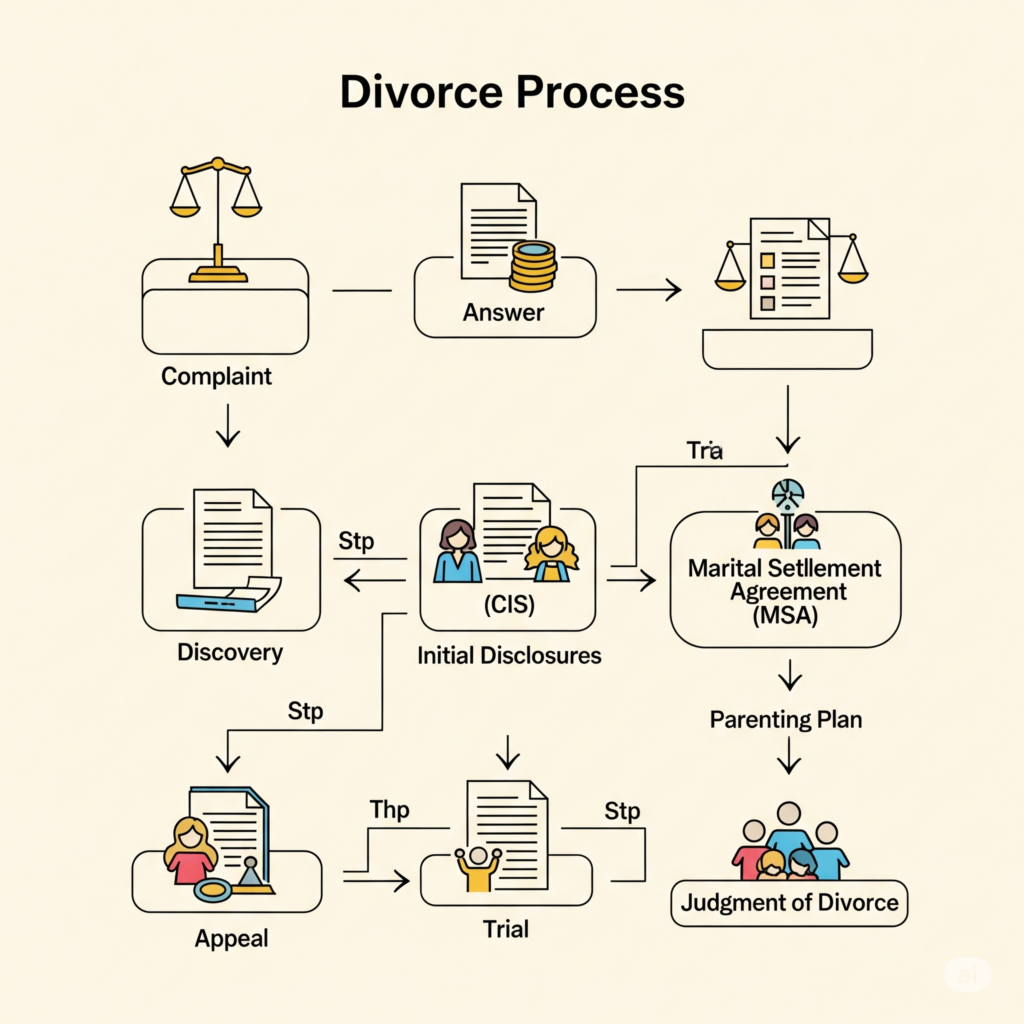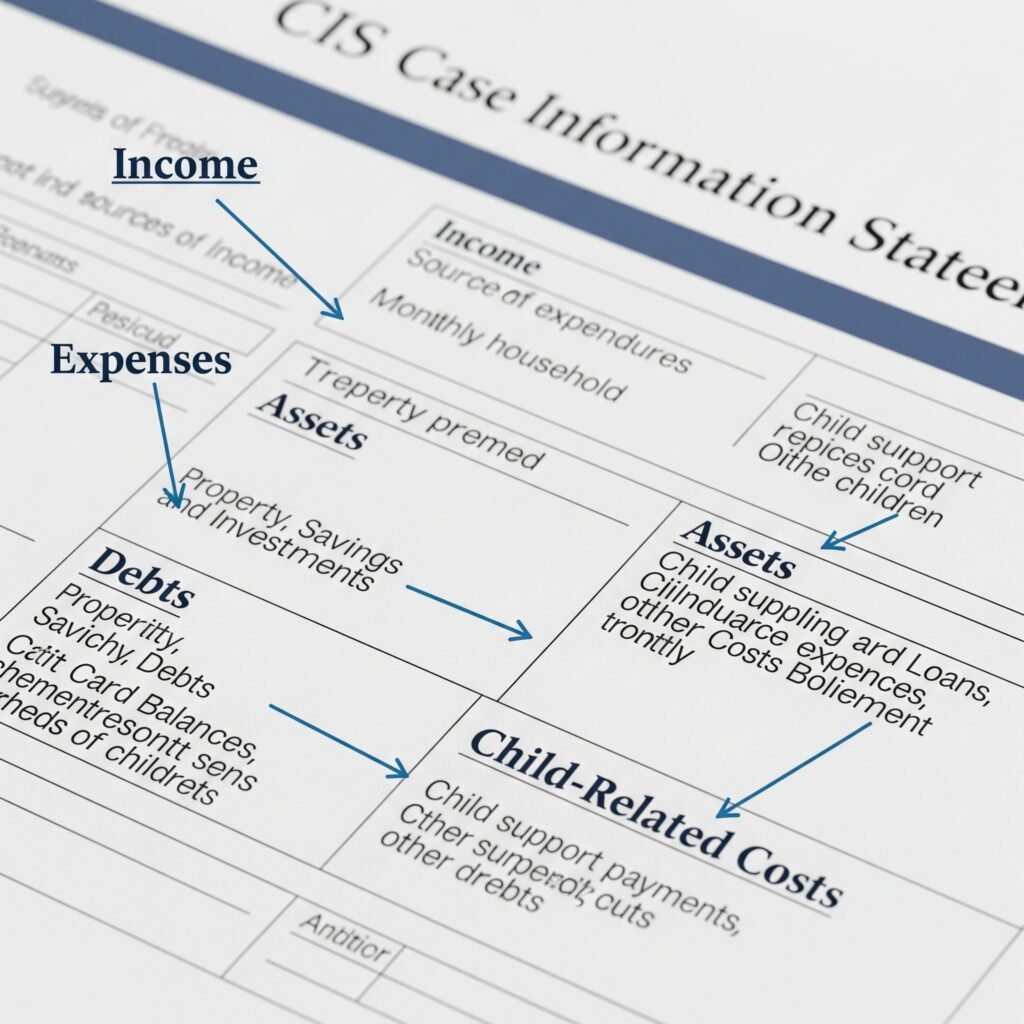Introduction: Feeling Lost in a Sea of Divorce Documents? Let Us Simplify It.
Divorce is emotional enough—add to that a stack of unfamiliar paperwork filled with legal jargon, and it is easy to feel overwhelmed, confused, and even scared of making the wrong move. Maybe you have been handed a “Case Information Statement” and have no clue what it means. Or perhaps you are staring at a Marital Settlement Agreement, wondering if it protects your future.
If that is you, take a deep breath. You are not alone. This guide will walk you through the most common divorce documents in New Jersey, explain what each one means in plain English, and show how they shape your financial, parental, and legal future.
🧾 Quick Legal Summary
- Divorce Complaint: Starts the legal process; sets tone for the case.
- Answer & Counterclaim: Responds to Complaint and may change divorce type.
- Case Information Statement (CIS): Vital for finances, support, and asset decisions.
- Marital Settlement Agreement (MSA): Finalizes asset division, alimony, custody.
- Parenting Plan: Outlines decision-making and living arrangements for children.
- Judgment of Divorce: Officially ends marriage; confirms all legal terms.
- QDRO: Needed to split retirement accounts properly.
Why Understanding Divorce Documents Is Crucial
Legal paperwork is not just red tape—it is the framework that will define your post-divorce life. From custody agreements to financial disclosures, these documents impact everything from where your kids sleep on Christmas to how much support you will pay for (or receive).
Why You Should Pay Attention:
- Errors or omissions can delay your case—or cost you financially.
- Misunderstandings can result in unequal or unenforceable agreements.
- Informed clients make better, more empowered decisions.

Divorce Process Flowchart with key document touchpoints
The Most Common Divorce Documents—and What They Really Mean
1. Divorce Complaint (or Petition for Divorce)
This is the formal start of your divorce. It is filed by the spouse initiating the case (the “plaintiff”) and includes:
- The grounds for divorce (e.g., irreconcilable differences)
- Basic background info: date of marriage, children, current addresses
Why It Matters: It frames your divorce timeline and sets the tone for how issues will be addressed (amicably or not).
2. Answer and Counterclaim
The spouse who receives the Complaint (the “defendant”) files an Answer to agree or contest the claims—and may include a Counterclaim (e.g., a different ground for divorce).
Why It Matters: It determines whether the divorce is contested and can impact negotiations.
3. Case Information Statement (CIS)
This is one of the most critical financial documents in any NJ divorce. It details:
- Income, monthly expenses, debts, and assets
- Child-related costs and lifestyle budgets
💼 Document Tip from Ziegler Law Group
Always have your attorney review all agreements—even if they were drafted in mediation. Don’t risk signing something that could harm your future.
Why It Matters: Judges use it to decide alimony, child support, and property division.

Annotated sample CIS highlighting key financial sections
4. Marital Settlement Agreement (MSA)
Also known as a Property Settlement Agreement, the MSA outlines all final terms of the divorce:
- Division of assets and debts
- Alimony and support
- Custody arrangements
Why It Matters: Once signed and filed, it becomes a legally binding contract.
💡 Pro Tip: Always have your attorney review this in full—even if it was drafted during mediation.
5. Parenting Plan / Custody Agreement
This document outlines:
- Legal custody (decision-making authority)
- Physical custody (where the children live)
- Holiday schedules, transportation, and vacation rules
Why It Matters: This governs co-parenting logistics—and can prevent future disputes.

Sample parenting schedule calendar
6. Judgment of Divorce
This is the official court order that ends your marriage. It includes:
- Confirmation of the MSA
- Legal approval of custody and support terms
Why It Matters: It is enforceable by law. Keep multiple a certified copy for your records.
7. Qualified Domestic Relations Order (QDRO)
Used to split retirement accounts (like 401(k)s or pensions) without triggering tax penalties.
Why It Matters: If you do not file a QDRO correctly, you may lose your share—or pay unexpected taxes.
💡 Caution: A QDRO must be approved by both the court and the retirement plan administrator.
Documents You May Encounter in Contested or Complex Cases
Some divorces require additional documentation, especially if litigation is involved.
Examples Include:
- Interrogatories (formal questions from the other party)
- Notices to produce documents (requests for bank records, emails, etc.)
- Expert reports (business valuations, custody evaluations)
- Emergency motions (urgent custody or support applications and orders)
Side-by-Side Comparison of Key Documents in Uncontested vs. Contested Divorces in New Jersey
| Document | Uncontested Divorce | Contested Divorce |
|---|---|---|
| Case Information Statement (CIS) | ✔️ | ✔️ |
| Marital Settlement Agreement (MSA) | ✔️ (Often submitted jointly) | ✔️ (Usually after negotiation or court ruling) |
| Parenting Plan | ✔️ (Agreed in advance) | ✔️ (May require mediation or court input) |
| Discovery Documents | ❌ (Often waived) | ✔️ (Required for full financial transparency) |
| Notice of Motion | ❌ | ✔️ (Filed during disputes) |
| Final Judgment of Divorce | ✔️ (Entered by agreement) | ✔️ (After trial or settled hearing) |
How These Documents Affect Your Long-Term Future
Each paper you sign shapes your new life—from financial security to parental rights.
Long-Term Implications Include:
- Financial: The CIS and MSA determine ongoing support, asset ownership, and tax burdens.
- Parental: Custody agreements shape how often you see your children—and under what terms.
- Legal: Mistakes or ambiguity in paperwork can lead to enforcement battles or costly post-judgment modifications.
💡 Pro Tip: Keep digital and hard copies of all documents in a secure, organized location. Create folders by topic: finances, custody, court orders.
Why Ziegler Law Group Helps You Read Between the Legal Lines
At Ziegler Law Group, we do more than file forms. We walk you through every line of your divorce documents, so you understand:
- What you are agreeing to
- What you might be giving up
- And how to protect your long-term interests
Whether you are going through mediation, litigation, or post-judgment changes, we ensure that no paperwork leaves you in the dark.
Schedule a document review consultation with a NJ divorce attorney at Ziegler Law Group
❓ Frequently Asked Questions
- What if I do not understand something I am asked to sign?
You should never sign any legal document without a full review by an attorney. The Ziegler Law Group provides document analysis services to ensure you fully understand every agreement. - Can I revise a Marital Settlement Agreement after the divorce is finalized?
Yes, but only through a court-approved modification, which typically requires a significant change in circumstances, such as a loss of income or change in parenting needs. - Is the Case Information Statement (CIS) legally binding?
Not independently. However, the CIS is heavily relied upon by the court to determine financial support, property division, and alimony, making its accuracy vital. - What is the difference between a parenting plan and a custody order?
A parenting plan is a proposed agreement between parents about custody and parenting time. A custody order is issued by the court and is legally enforceable. - What if my spouse refuses to follow the Marital Settlement Agreement?
You may file a motion for enforcement with the court. The judge can impose penalties or compel compliance based on the original agreement. - Do both spouses need to approve a QDRO?
Yes. A Qualified Domestic Relations Order must be reviewed by both parties, submitted to the court, and accepted by the retirement plan administrator. - What is a Notice of Motion?
It is a formal document asking the court to take specific action, often used in contested divorces to resolve disputes such as child support, custody, or spousal maintenance. - Is discovery required in every divorce?
No. In uncontested divorces, discovery is often waived. However, it is essential in contested cases to ensure transparency about finances and assets. - Why is the Judgment of Divorce important?
It is the final order that legally ends your marriage and validates all agreements. Keeping certified copies is essential for future legal, tax, or custody matters. - What if financial information is withheld during the divorce?
You can request formal discovery through interrogatories or document production. If necessary, the court can order full disclosure and impose penalties for noncompliance.
🎯 Next Step: Download our free “Divorce Document Decoder” and speak with Ziegler Law Group to ensure every paper you sign supports your future.
📞 Call 973-533-1100 or book your consultation online
📞 Need Help With Your Divorce Documents?
Call 973-533-1100 or book your consultation online with a trusted NJ divorce attorney.






